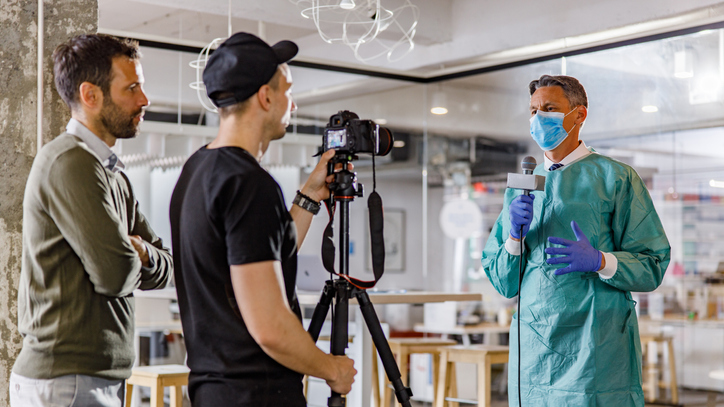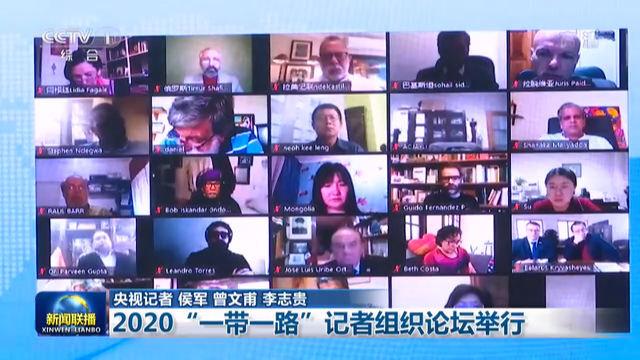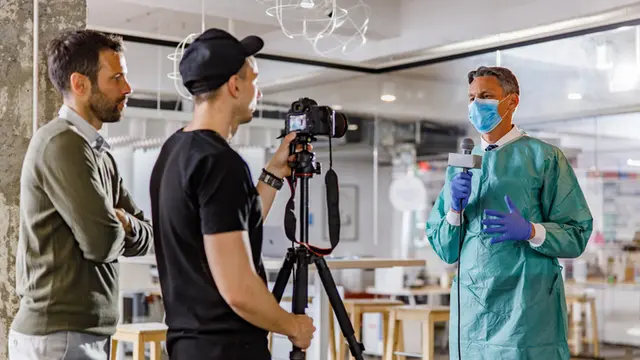
A doctor giving an interview in front of the camera and journalists in a hospital. /Getty
Editor's note: Stephen Ndegwa is a Nairobi-based communication expert, lecturer-scholar at the United States International University-Africa, author and international affairs columnist. The article reflects the author's opinions and not necessarily the views of CGTN.
The critical role played by the media in any country's economic growth cannot be gainsaid. This is more so at this time when the world is going through an unprecedented crisis due to the COVID-19 pandemic.
Of course, the role of the media even during the pandemic remains the same, though more critical. The functions of education and information dissemination have taken even greater significance as billions of people try to keep abreast of current events due to the prevailing uncertainties. Containment measures and other travel restrictions have also given media's entertainment role renewed importance.
Unfortunately, not everyone is on the same page, as far as using media for the betterment of humanity is concerned, a sad fact that was underscored during the second Belt and Road Journalists Forum held in Beijing on November 25. The virtual conference was attended by more than 120 leaders of journalist organizations from over 60 countries and regions that comprise the journalists' Belt and Road Initiative (BRI) network.
A joint statement issued at the forum called on media organizations and journalists to consciously spread objective, rational and scientific voices, firmly support multilateralism and resist discrimination and stigmatization. This resonated perfectly with what is currently happening, with so much misinformation being perpetuated through the media about the origins of COVID-19.
Participants laid a lot of emphasis on the need of writing truthfully and factually. Instead of creating mutual understanding between peoples of the world, some sections of the media have misused their calling and privileged position to foment mistrust and hostility in order to serve some selfish interests.
The Western media was called out for perpetuating information about cold wars and targeting those that do not subscribe to its superiority minded ideology. Participants observed that "the world is at a critical juncture where misunderstanding can lead to total destruction of the already delicate social and economic structures. In fighting the pandemic, the BRI journalist network has become a bridge for solidarity and cooperation between journalist organizations.”
Indeed, journalists should help fight the relentless misinformation about both the BRI and the coronavirus pandemic.

Leaders of journalist organizations from the Belt and Road countries gathered at a virtual forum to discuss post-pandemic media exchanges and cooperation, November 26, 2020. /CGTN
This entails offering thought leadership and expert views through in-depth analysis and commentaries in various media channels. This will debunk fake news and outright lies that have been used to fight any alternative views from those held by the North.
It is not coincidental that the network consists of journalists from the South, who see the benefits of transformational projects like the BRI for the developing world. Constantly giving updates of the project's progress and the changes it is making not only puts its critics to shame, but also galvanizes support by its partner beneficiaries.
Like in any other field, training for journalists is important in enabling effective gatekeeping. Quite a good number of the negativity in the media thrives because those responsible for verifying the truth lack the prerequisite skills. But even before news reaches the last process, these frontline gatherers of information should have the capacity to determine the veracity of information they intend to use at source.
Luckily, digital media has helped matters a lot by enabling collaboration and networking across media and journalism networks in matters of technology, culture, health and the arts. Journalist networks can also help fight the escalating epidemic of information characterized by the promotion of selfish imperialist and capitalist systems.
But journalists are also human, and many of them have fallen by the wayside due to COVID-19, some paying with their lives for the profession they adore. For instance, in Bangladesh, 1,000 journalists have lost their lives this year, 200 are currently infected with the coronavirus, and 600 have lost their jobs. Hundreds of others are working at half pay as media houses struggle to survive.
Therefore, the physical and mental health of journalists should not be taken for granted. Neglecting the health of these frontline professionals does not augur well for society, since it will translate to purveying unintentional distortion of facts and subsequent dissemination of half-baked information.
The deputy head of the Publicity Department of the Communist Party of China Central Committee and director of China's State Council Information Office, Xu Lin, stressed that "the press community should never lose sight of its calling as the bearer of truth, and should work together to safeguard the truth, protect the environment and remove prejudice," among other cardinal roles.
Similar to the BRI itself, the journalist network should be a symbol of technological cooperation, peace, transparency and opening up throughout the places the project passes. Ultimately, journalists must defend the truth with the same passion that propagandists engage in misinformation campaigns.
(If you want to contribute and have specific expertise, please contact us at [email protected].)
 简体中文
简体中文

